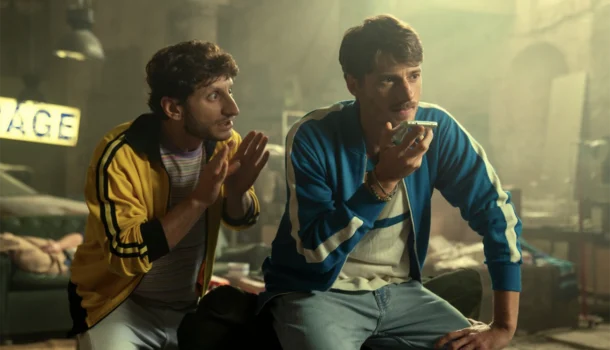There are forms of love that never announce their departure — they simply fade, like the lingering trace of perfume in the air after the one who wore it is long gone. When they vanish, they leave behind more than absence — a sensory echo of everything that was once lived, or perhaps only imagined. On certain days, that absence takes on a gentle sweetness; on others, it sours, like an unripe citrus. As time moves on, the body often grows accustomed to defeating the chill of an empty bed and the fatigue of routine, all while unaware that true exhaustion lies deeper — in the soul. Loneliness, meanwhile, bears the treacherous elegance of silent predators: it waits patiently for the right moment and, when it strikes, it wounds precisely where we pretend to be whole.
Vito, the central figure in “The Love Scam,” didn’t escape such a trap. He gave in to his most primal impulses and threw himself into a domestic setup doomed from the start — a fiasco that left him with a child, radiant and scene-stealing, unaware that he is the film’s only element untouched by artifice. Director Umberto Riccioni Carteni digs comedically through the emotional and social wreckage of a Neapolitan man who lives by petty tricks and streetwise charm. Beneath the humor lies a desperate attempt to avoid eviction and cling, however precariously, to a place in the world. Alongside his equally hapless brother and the child who gives his days new meaning, Vito is forced to hatch a plan as chaotic as his own life.
Within that chaos lies a familiar irony found in many Italian comedies — the tension between what one longs for and what one can actually bear to desire. Italy, with its deeply human contradictions, provides the perfect backdrop for this collage of missteps and yearning. Every morning seems to reset the stage, as if the characters could rebuild themselves from yesterday’s ruins. Vito is one of those figures who hover between the pathetic and the quietly defiant, as if burdened by generations of unresolved dreams. Yet the script smartly denies him easy sympathy. The child’s innocence doesn’t redeem the father — it merely exposes his immaturity.
With a tone unafraid of exaggeration, screenwriters Salvadori and Zecca place their characters in a kind of performative decay: the crumbling building isn’t just a setting, it’s a metaphor made tangible. It’s hard not to think of the tragicomic rhythm of “Three Men and a Baby,” or the farcical brilliance of “La Cage aux Folles,” though without Molinaro’s subversive finesse. The trio of Vito, Napoleone, and Antonello teeters on the edge of absurdity, yet somehow still reflects a recognizable kind of humanity — that tendency of lost men to try and build homes from the wreckage of feelings they never learned to name.
Into this unstable scenario enters Marina, a driven architect intent on demolishing the past and replacing it with a symbol of progress. But the heart of the film lies in the emotional stumble that follows: Carlo — or Vito, depending on the ruse — draws close to her with a scheme, only to be caught off guard by the sincerity that blooms between them. Laura Adriani and Antonio Folletto maintain a tension between calculation and spontaneity, forming a pair whose chemistry carries more weight than the plot’s believability. What could have been just another romantic con gains unexpected depth when we realize that Carteni isn’t chasing a happy ending, but rather a rupture in his characters’ illusions.
By resisting easy romanticism and dodging formulaic storytelling, “The Love Scam” stumbles — but it does so with flair. It’s no fairy tale, nor a sermon on fatherhood or redemption. It’s a farce with glimmers of truth, and perhaps that’s what makes it work: it acknowledges, even subtly, that love too can be a carefully constructed disguise — and that sometimes, it’s precisely these disguises that steer us, unknowingly, toward something real.
Film: The Love Scam
Director: Umberto Riccioni Carteni
Year: 2025
Genres: Comedy/Romance
Rating: 7/10

